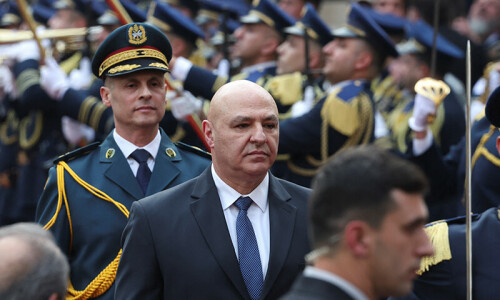BISSAU: In coup-prone Guinea-Bissau, shaken this weekend by an attack by mutineering soldiers of the president’s residence which left two people dead, the army is at once the backbone of the state and a destabilising factor.
The poverty-stricken West African nation has been the scene of several coups and attempted coups since its independence in 1974 from Portugal. While the authorities are officially calling Sunday’s attack on President Joao Bernardo Vieira’s residence a mutiny some observers see it as a failed attempt to seize power.
“The army has always been a political instrument before and after the freedom struggle (led by the African Party for the Independence of Guinea-Bissau and Cape Verde PAIGC)”, political scientist Fafaly Koudawo said.
According to him the army feels entitled to mix in politics because of the important role in securing independence fighting the Portuguese army.
“Guinea-Bissau does not have an army (as such). It has armed militants but the army is completely politicised,” Idrisda Djalo, leader of the opposition PUN party, told AFP.
Sunday’s attack by apparent mutinous soldiers has again raised questions about the role of the army in Guinea-Bissau politics.
However the United Nations representative’s bureau in the country says the attack was carried out by “a few soldiers”.
“The army of Guinea-Bissau as a whole is really committed to the process of consolidating the state institutions,” it said.
The International Crisis Group (ICG) think tank wrote in their July report on Guinea-Bissau that “above all, army reform is needed most urgently to free the political system from military interference”.
The project to reform the army which faces “low salaries, badly maintained barracks and poor food rations” according to Koudawo, is trying to cut down troops and rehabilitate former soldiers into civil society.
One of the problems is the size of the army. According to a United Nations report, Guinea-Bissau has a very high number of soldiers relative to the state’s means.
“The number of active soldiers is 4,458 which translates to a ratio of 2.73 soldiers for every 1,000 inhabitants” on a population of 1.6 million, the UN said. The regional average is at 1.23 soldiers per 1,000 inhabitants.
“The soldiers had a vested interest in trying to make it seem that the army was more important to keep its hold” over political life and also because it meant more financial aid for the project of military reform, Emmanuelle Bernard, the International Crisis Group Guinea-Bissau specialist, told AFP in Bissau.
There have already been three failed attempts to reform the army in the 1970s, the 1980s and the 1990s, Koudawo said.
“The compensations offered (for demobilisation) were dismissed as not high enough especially by the retired soldiers,” he explained.
The army is also struggling with ethnic divides. Experts note that most officers, especially younger officers are of the Balante ethnicity, one of the largest ethnicities in Guinea-Bissau, while the ordinary soldiers are much more mixed.
On top of that some soldiers are involved in drugs smuggling and are thus opposed “to a reform that could force them into retirement and cut them off from lucrative drugs trafficking income”, the International Crisis Group said.—AFP















































Dear visitor, the comments section is undergoing an overhaul and will return soon.